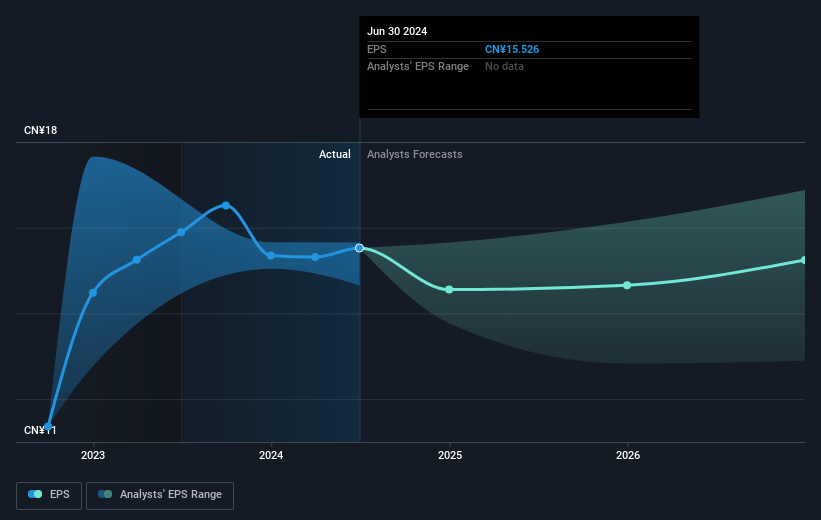- United States
- /
- Interactive Media and Services
- /
- NYSE:ATHM
The five-year loss for Autohome (NYSE:ATHM) shareholders likely driven by its shrinking earnings

Statistically speaking, long term investing is a profitable endeavour. But no-one is immune from buying too high. To wit, the Autohome Inc. (NYSE:ATHM) share price managed to fall 72% over five long years. We certainly feel for shareholders who bought near the top. Furthermore, it's down 10% in about a quarter. That's not much fun for holders. We note that the company has reported results fairly recently; and the market is hardly delighted. You can check out the latest numbers in our company report.
On a more encouraging note the company has added US$145m to its market cap in just the last 7 days, so let's see if we can determine what's driven the five-year loss for shareholders.
See our latest analysis for Autohome
While the efficient markets hypothesis continues to be taught by some, it has been proven that markets are over-reactive dynamic systems, and investors are not always rational. One way to examine how market sentiment has changed over time is to look at the interaction between a company's share price and its earnings per share (EPS).
During the five years over which the share price declined, Autohome's earnings per share (EPS) dropped by 10% each year. Readers should note that the share price has fallen faster than the EPS, at a rate of 22% per year, over the period. This implies that the market was previously too optimistic about the stock. The less favorable sentiment is reflected in its current P/E ratio of 11.15.
You can see how EPS has changed over time in the image below (click on the chart to see the exact values).

This free interactive report on Autohome's earnings, revenue and cash flow is a great place to start, if you want to investigate the stock further.
What About Dividends?
As well as measuring the share price return, investors should also consider the total shareholder return (TSR). Whereas the share price return only reflects the change in the share price, the TSR includes the value of dividends (assuming they were reinvested) and the benefit of any discounted capital raising or spin-off. So for companies that pay a generous dividend, the TSR is often a lot higher than the share price return. We note that for Autohome the TSR over the last 5 years was -68%, which is better than the share price return mentioned above. This is largely a result of its dividend payments!
A Different Perspective
Autohome shareholders are down 11% for the year (even including dividends), but the market itself is up 27%. However, keep in mind that even the best stocks will sometimes underperform the market over a twelve month period. Unfortunately, longer term shareholders are suffering worse, given the loss of 11% doled out over the last five years. We'd need to see some sustained improvements in the key metrics before we could muster much enthusiasm. While it is well worth considering the different impacts that market conditions can have on the share price, there are other factors that are even more important. Take risks, for example - Autohome has 1 warning sign we think you should be aware of.
But note: Autohome may not be the best stock to buy. So take a peek at this free list of interesting companies with past earnings growth (and further growth forecast).
Please note, the market returns quoted in this article reflect the market weighted average returns of stocks that currently trade on American exchanges.
New: Manage All Your Stock Portfolios in One Place
We've created the ultimate portfolio companion for stock investors, and it's free.
• Connect an unlimited number of Portfolios and see your total in one currency
• Be alerted to new Warning Signs or Risks via email or mobile
• Track the Fair Value of your stocks
Have feedback on this article? Concerned about the content? Get in touch with us directly. Alternatively, email editorial-team (at) simplywallst.com.
This article by Simply Wall St is general in nature. We provide commentary based on historical data and analyst forecasts only using an unbiased methodology and our articles are not intended to be financial advice. It does not constitute a recommendation to buy or sell any stock, and does not take account of your objectives, or your financial situation. We aim to bring you long-term focused analysis driven by fundamental data. Note that our analysis may not factor in the latest price-sensitive company announcements or qualitative material. Simply Wall St has no position in any stocks mentioned.
About NYSE:ATHM
Autohome
Operates as an online destination for automobile consumers in the People’s Republic of China.
Flawless balance sheet and good value.
Similar Companies
Market Insights
Community Narratives


